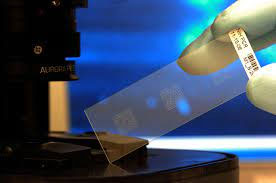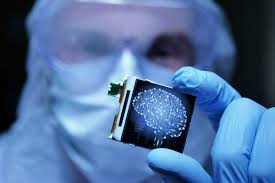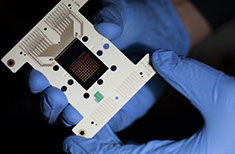


<
>
PHOTONIC HYBRIDS AND NANOMATERIALS GROUP
Aveiro-Portugal
university of aveiro
theoria poiesis praxis
physics department
ciceco
aveiro institute of materials


HOME > SCIENTIFIC OUTPUT > PROJECTS > LOGIC ALL

Designação do projeto |
Código do projeto |
Objetivo principal|
Região de intervenção |
Entidade beneficiária |
LogicALL – Molecular logic devices and computing based on luminescent materials actuated by physical inputs
PTDC/CTM-CTM/0340/2021
Reforçar a investigação, o desenvolvimento tecnológico e a inovação
Programa Operacional do Centro
Universidade de Aveiro

Data de início | 01-01-2022 Data de conclusão | 31-12-2024
Custo total elegível | 249 662,50€
ObjeCtivES
The stunning development that electronics has experienced in recent decades has made it possible today to incorporate millions of electronic components on a chip measuring just a few square centimeters. However, this top-down miniaturization is reaching its limit, which is a very relevant challenge for the relentless demand for more computing power at a competitive price. One way to pursue miniaturization is based on the design of molecules capable of performing the same operations as current electronic components, with clear gains in terms of integration.
The bottom-up approach in molecular logic devices was introduced in the early 1990s by Professor Prassana de Silva under the name molecular logic, and since then the field has evolved to perform logic functions and operations using various molecules. Typically, the molecules are actuated by an external stimulus (such as a chemical species) that changes the physicochemical properties of the molecule, (e.g., absorption, emission, etc), between a state that is assigned the logical value of zero (0) and another state that is assigned the logical value of one (1).
The LogicALL project aims at the production and characterization of molecular logic devices based on luminescent materials, such as those based on Ln3+ ions, and actuated by physical stimuli, laying the foundation for the establishment of innovative solutions in molecular logic for computing.



JOURNAL ARTICLES
S. Zanella, M.A. Hernández‐Rodríguez, L. Fu, L.D. Carlos, R.A.S. Ferreira, C.D.S. Brites "Reprogrammable and Reconfigurable Photonic Molecular Logic Gates Based on Ln3+ Ions" Advanced Optical Materials , 10, 2200138. (2022) https://doi.org/10.1002/adom.202200138
S. Zanella, E. Trave, E. Moretti, A. Talon, M. Back, L.D. Carlos, R.A.S. Ferreira, C.D.S. Brites "Designing Ln3+-doped BiF3 particles for luminescent primary thermometry and molecular logic" Frontiers in Photonics, 3, 44 (2022) https://doi.org/10.3389/fphot.2022.1010958
M.A. Hernández‐Rodríguez, S. Zanella, L. Fu, A. N Carneiro Neto, L.D. Carlos, C.D.S. Brites "Designing All‐Photonic Molecular Analogs for Electrical Components: A Reprogrammable Luminescent Filter Based on Ln3+ Ions" Laser Photonics Reviews, 17, 2200877 (2023) https://doi.org/10.1002/lpor.202200877
J.A.A. Coelho, R.T. Moura, R.L. Longo, O.L. Malta, A.N. Carneiro Neto, "Modeling the Eu(III)-to-Cr(III) Energy Transfer Rates in Luminescent Bimetallic Complexes" Inorganics, 11(1), 38 (2023), https://doi.org/10.3390/inorganics11010038
S. Zanella, M.A. Hernández-Rodríguez, R.A.S. Ferreira, C.D.S. Brites "Lanthanide-based logic: a venture for the future of molecular computing" (Feature Article) Chem. Commun. (2023) https://doi.org/10.1039/D3CC01827J
MADE BY PHANTOM-G, AVEIRO, PORTUGAL
